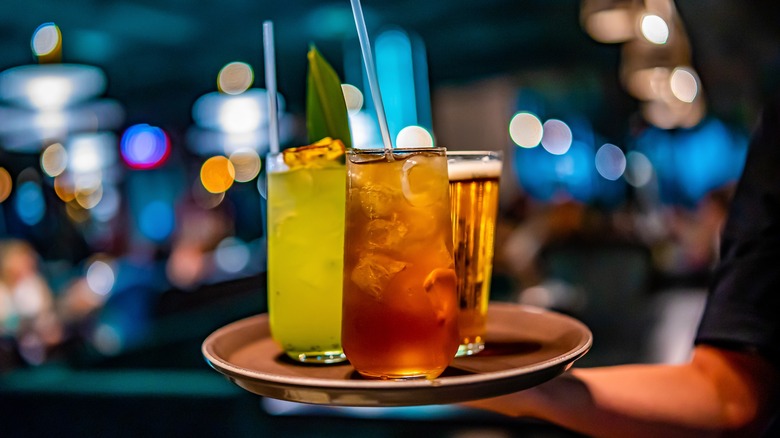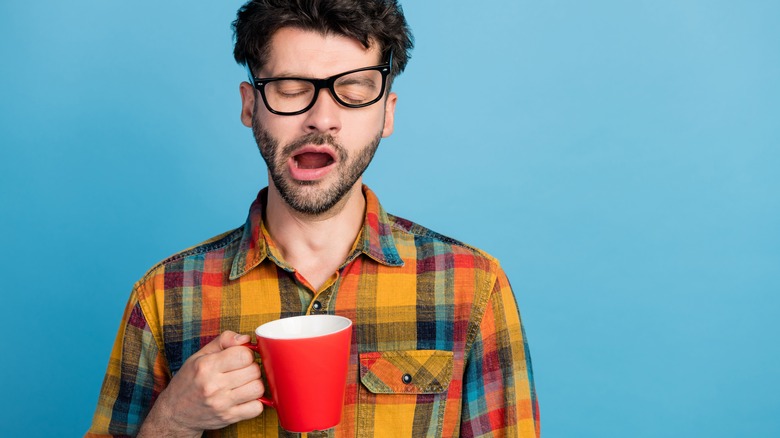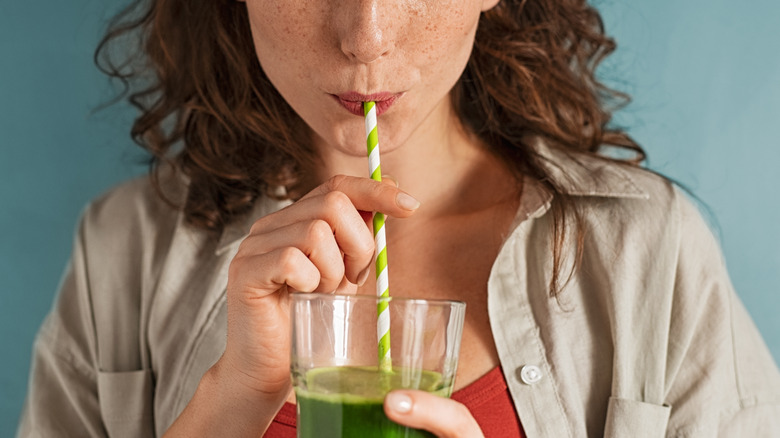Why You Shouldn't Believe 'Beer Before Liquor, Never Sicker'
We've all heard the saying, "Beer before liquor, never sicker." It is oft repeated before the start of a night of drinking, or after said night of drinking, when you've hit the reaping portion of the evening, rather than the sowing. The belief that drinking beer before liquor, which has a higher alcohol content, can make your hangovers worse is almost ubiquitously upheld by drinkers as a stone-cold fact. However, it turns out that this common drinking guidance is actually not true.
A 2019 study in The American Journal of Clinical Nutrition, which looked at 90 participants' drinking orders, found that the order of alcohol types consumed did not impact hangover severity in participants. However, the study did find that one's level of drunkenness did impact hangover severity. Essentially, the drunker you get, the worse your hangover is likely to be. And perhaps this is the basis of the myth. General guidance tends to hinge on not drinking more intense alcohol towards the end of an evening after you've already consumed other alcohol. On some level this makes sense. However, it simply isn't the key to preventing hangovers.
The only tried and true way to really prevent hangovers is to drink less alcohol overall. And, yes, that is less fun than repeating a rhyme and then doing a baby Guinness shot. But understanding how drinking impacts your body can help you to avoid that pesky morning headache.
What could be contributing to your hangover
But what causes hangovers in the first place? The answer is multilayered. Drinking alcohol can cause the kidneys to flush fluids excessively (which is why you must make many bathroom trips while drinking). This can cause you to become dehydrated, and develop pretty pesky symptoms such as a headache.
Another factor that contributes to hangovers is a disruption in sleep patterns. Now, this may seem contradictory, as alcohol can help induce sleep for many people. However, though it can cause sleepiness, alcohol can also decrease your quality of sleep, making for overall grogginess the day after a night out.
Additionally, alcohol can cause inflammation that may lead to feelings of sickness or overall malaise. For some people, alcohol can cause an upset stomach, nausea, and even vomiting. Of course, overdoing it on drinking may cause you to be sick, but beyond this, alcohol can disturb the stomach lining, and cause sickness the following day.
All of these factors may impact your hangover level the next day, none of which have to do with which alcohol you choose to consume first. However, there are certain ways to stave off or tend to a hangover if you want to go out without feeling awful the next day.
Keeping the hair of the dog at bay
So, how does one stave off a hangover if those fun little sayings don't do the trick? Well, for one, you might want to start with simply drinking less alcohol. There is a correlation between level of drunkenness and hangover severity. So make sure to drink carefully.
Another way of staving off a hangover is to not start your night out on an empty stomach. Drinking on an empty stomach can cause alcohol to be absorbed into your body more quickly, spiking your blood alcohol levels, and causing worse hangover symptoms. So make sure to snack your way through the evening as you drink. Staying hydrated is also important when drinking, as dehydration often impacts hangover symptoms. There are even some cocktails that might help to keep hydrated during the night, though you'll also want to drink water as well.
Other factors, such as your frequency of drinking, and whether or not you smoke can also impact your hangovers. Frequent drinkers are more likely to experience hangovers, so it might be helpful to space out the days you consume alcohol. You can even try some creative mocktails when going out. But of course, you may also be one of the unlucky drinkers who are simply genetically predisposed to becoming hungover. Yes, genetics do come into play with regard to how your body metabolizes alcohol. And for some people, drinking is simply more likely to cause hangovers, regardless of how much they drink. So make sure to monitor how your body responds to alcohol, and respond accordingly.
Unfortunately, there is no glib saying for this guidance. But the key with alcohol seems to be moderation, thoughtful consumption, and hydration.


